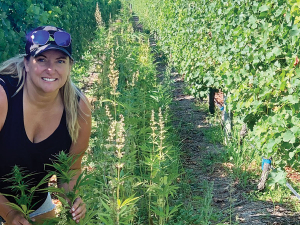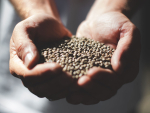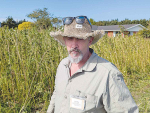A study of hemp growing between the rows in New Zealand vineyards shows “exciting” results that the hemp beneficially affects soils and wines.
The research, carried out over three years in Marlborough Sauvignon Blanc vineyards by grape grower Kirsty Harkness and viticulture researcher Dr Mark Krasnow, shows hemp is a viable cover crop for New Zealand Sauvignon Blanc vineyards.
Industrial hemp seeds were sown in the midrow of three Marlborough Sauvignon Blanc vineyards to assess the effects of hemp as a cover crop/intercrop on the vines and the vineyard soil. The hemp became established without supplemental irrigation, even in an exceptionally dry season when other cover crops failed to thrive. This allowed hemp to continue to grow and sequester carbon longer into the season. Hemp plants grew large tap roots to at least 30cm, and were able to grow in compacted tractor wheel tracks in the row, where the root system can alleviate compaction caused by vineyard operations.
Soils from the hemp area were higher in organic matter and total carbon, which are beneficial for the long-term health and fertility of the soils. Differences were especially pronounced at 40-80cm, suggesting hemp allows sequestration of more carbon deeper into the soil profile than other cover crops or resident vegetation. Juice from grapes adjacent to hemp had greater populations of native yeasts, and produced a wine of higher quality than juice from vines sited far from the hemp.
“That hemp did not compete with vines, but beneficially affected soils and wines, is very exciting. The differences in native yeast populations brought about by a hemp cover crop is an aspect sparking much interest,” Kirsty says. “The suggestion that hemp could improve wine quality is an interesting further study topic, but not a path I’m currently going down. As a grape grower, my focus is on producing the highest quality fruit, and improving soil health in vineyards.”
Mark says the result showing a lack of competition with the grapes is “a little surprising, considering how large some of the plants grew”. While not directly assessed in this study, he sees hemp in mixture with other cover crops – such as clover for nitrogen and buckwheat for beneficial insects – as offering huge potential for vineyards, not just to produce better grapes with fewer inputs, and sequester carbon, but also to alleviate soil compaction in the tractor wheel tracks – a major issue in vineyard soils.
His vision is a vineyard where there is no grass sown, and thus no mowing needed. A mixed cover crop sward, including hemp, is sown instead, which is then crimp-rolled as mulch when vineyard crews need to walk down rows. This new paradigm would improve grape quality, conserve water, be bee friendly, use less diesel, and ultimately cost less money, he says. “Mowing doesn’t add to wine quality. It may look lovely and more tidy as people drive past, but it’s not that great for the soil.”
This study shows the promise of hemp as a cover crop in vineyards, Mark says. “Its ability to survive with little water, its robust root system which adds carbon to the soil, and its ability to grow in and improve compacted soils, makes it a useful tool for vineyard management.”
To read the full report go to bit.ly/3Rr8Yrm












